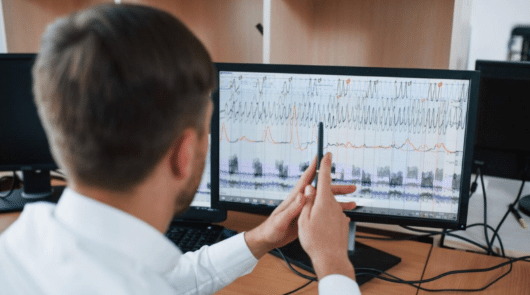When you’re the subject of a regular detective investigation, there are usually only two possible outcomes.
You can pass the tests and get eliminated from the suspects’ pool. Or, you fail and come under even more intense scrutiny.
But with lie detector tests, there are two other possible scenarios – false and inconclusive results.
This post explains the fundamental differences between a false and inconclusive polygraph exam.
What Is a False Polygraph Exam?
A false polygraph exam is one that yields an inaccurate outcome.
Ideally, a lie detector test should find an innocent person honest and a guilty one deceptive. But the technique isn’t foolproof.
The American Polygraph Association (APA) states that a professionally administered single-issue lie detector test can achieve up to 95% accuracy. 95% is a remarkable accuracy score, even if it only factors in single-issue testing.
However, a 5% error rate isn’t to be discounted either. Coupled with other in-test dynamics, this error margin may cause an examiner to inadvertently misinterpret polygraph findings.
Types of False Polygraph Exams
1. False Positives
A false positive is a polygraph exam that judges an innocent person as being deceptive. While relatively infrequent, these findings can have far-reaching consequences.
False positives could cause an examinee to lose their name and reputation. Besides, they may corroborate other pieces of circumstantial evidence to have the subject receive unjust penalties.
2. False Negatives
In false negatives, a deceptive person is ruled as being truthful. The consequences of false negatives can be just as devastating.
When a polygraph exam erroneously finds a guilty person to be honest, the examinee may escape justice and continue to pose a threat to society.
Serial killer Gary Ridgway is a classic case in point.
Also known as the Green River Killer, Ridgway beat a lie detector test and went on to claim multiple victims. The law only caught up with him years later when DNA evidence linked him to a previous murder.

What Is An Inconclusive Polygraph Exam?
After analyzing the physiological data recorded by a polygraph machine, an examiner assigns a numerical score indicating the probability of deception. However, certain evaluations may not yield definitive inferences.
An examiner might rule such tests as inconclusive.
Inconclusive polygraph findings mean the polygraph machine still collected valid charts. But the information was insufficient to render a solid verdict of truth or deception.
Causes of False and Inconclusive Tests and How to Remedy Them
False and inconclusive tests are typically due to the polygraph’s natural error margins.
Remember, no lie detector test can be 100% accurate. That’s because this technique doesn’t discern lying directly. Rather, it measures the levels of physiological arousal associated with deception.
Most people will experience elevated heart rate, blood pressure, skin conductivity, and respiration rate while lying. During in-test questioning, the polygraph machine records changes in these four physiological functions.
An examiner then analyzes the magnitude of deviations from pre-recorded baseline data to infer truthfulness or deception.
Other possible causes of false and inconclusive polygraph tests include;
a) Certain Medications
Some drugs may arouse an examinee’s physiological functions during polygraph tests, leading to false positives or false negatives. This applies to both controlled substances and prescription medications.
In the case of false negatives, an examinee may intentionally deploy pharmacological countermeasures. This refers to administering certain drugs to beat a lie detector test.
Before conducting a lie detector test, professional examiners will establish preliminary contact with the would-be examinees and prepare them for the upcoming evaluation. Part of the preparation includes informing the individuals to avoid taking certain medications ahead of a polygraph exam.
An examiner will also underscore the significance of remaining calm and being truthful throughout the procedure.

b) Deploying Other Countermeasures
Besides pharmacological countermeasures, polygraph countermeasures can also be physical or mental.
Physical countermeasures are physical tactics an examinee may use to beat the polygraph. Examples include lip biting, muscle tensing, and teeth clenching.
Meanwhile, mental countermeasures include tactics like emotional suppression.
Again, examinees must remember that using countermeasures is both unproductive and counterproductive. If discovered, an examiner may instantly rule the outcome as deceptive or (in the best-case scenario) inconclusive.
c) Certain Conditions
Diseases that typically present with nervousness, such as post-traumatic stress disorder (PTSD), may also distort polygraph data.
Note that polygraphs don’t test for mental stress. In fact, there’s no conclusive evidence indicating that anxiety will directly alter the outcome of a lie detector test.
However, excessive nervousness can arouse all four physiological functions measured by polygraph machines. This could distort the quality of the collected data and cause an examiner to misjudge the test’s outcome.
When polygraphing mentally ill subjects, it’s important to collect accurate physiological baselines before conducting the test.

The Truth About False and Inconclusive Lie Detector Tests
False and inconclusive tests are both valid grounds to dismiss polygraph reports.
Neither finding points to an examinee’s honesty or deception directly. Rather, they suggest poor data collection and analysis.
More importantly, false and inconclusive polygraph findings underscore the imperative of working with an experienced polygrapher.
Before conducting a lie detector test, a professional examiner will begin by calibrating the polygraph machine. This helps streamline data collection by addressing potential equipment limitations.
An experienced examiner will also prepare the examinee adequately ahead of each polygraph test. The idea is to minimize in-test anxiety and unnecessary movements, which could compromise the integrity of the collected information.






